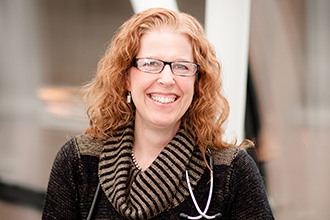Delayed access to cystic fibrosis drug could result in preventable death: study

By Jennifer Stranges

Dr. Anne Stephenson
Cystic fibrosis (CF) is one of the most common fatal genetic disease affecting Canadian children and young adults. Approximately 4,300 Canadians live with the disease, which mainly affects the lungs and digestive system. CF is progressive, meaning it worsens over time, and lung damage will eventually lead to premature death.
While there is no cure, new therapies have emerged that show great promise. Among those therapies is Trikafta, a combination of three medications that could potentially help 90 per cent of the CF population in Canada – because it’s designed to target and modify the most common CF mutation. Trikafta is currently not available in Canada.
Now new research out of St. Michael’s Hospital, The Hospital for Sick Children (SickKids) and Dalhousie University shows how delaying access to Trikafta in Canada could result in avoidable death. Despite the high cost of the drug, advocates argue that its approval will lead to significant savings for the health care system by keeping individuals with CF out of hospitals, off of the transplant waitlist and leading productive lives.
The research, published in the Journal of Cystic Fibrosis, used a microsimulation model to forecast what would happen in three scenarios: if Trikafta was not made available in Canada, if it was made available in 2021, or if access was delayed until 2025.
The study showed that making Trikafta available in 2021 would result in 60 per cent fewer people with severe lung disease, 18 per cent increase in people with mild lung disease and 19 per cent fewer chest infections by 2030 compared to if the drug was not made available.
“Under assumptions based on phase three clinical trial results, our forecasts show that access to Trikafta, which corrects the underlying defect in CF, could significantly reduce the number of people with severe lung disease and extend life for people with CF,” says Dr. Anne Stephenson, senior author and clinical lead of the study.
“It is frustrating as a clinician to know that there is a medication that has the potential to improve the health of over 90 per cent of individuals living with CF but be unable to prescribe it.” says Dr. Stephenson, who is a respirologist and CF researcher at St. Michael’s Hospital in Toronto, which has the largest adult CF clinic in North America.
The study also forecasted that Trikafta could reduce deaths by 15 per cent, increase the median age of survival by 9.2 years by 2030 and reduce the number of transplants that are required for severe lung disease.
“Microsimulation based forecasts are useful tools to inform policy,” said Dr. Sanja Stanojevic, Assistant Professor in the Department of Community Health and Epidemiology at Dalhousie University and lead author on the study. “To make the forecasts as realistic as possible, we used all the information we know about people living with CF today, and the initial results from the Trikafta clinical trials to project the impact Trikafta may have on the CF population in the future.”
According to Cystic Fibrosis Canada, various barriers have contributed to the delay in access to Trikafta, including regulatory changes at the Patented Medicines Prices Review Board (PMPRB). Trikafta’s manufacturer, Vertex Pharmaceuticals, has not yet submitted Trikafta for approval to Health Canada, citing market uncertainty caused by the changes. Trikafta is available in the United States, and England, Ireland, Wales and Scotland have all reached agreements with the manufacturer to fund the drug as soon as the European license is granted this fall.
Disclosures
Members of the research team have previously received support from Vertex, the manufacturer of Trikafta, for previous work, including sponsored research unrelated to this study.
About St. Michael’s Hospital
St. Michael’s Hospital provides compassionate care to all who enter its doors. The hospital also provides outstanding medical education to future health care professionals in more than 27 academic disciplines. Critical care and trauma, heart disease, neurosurgery, diabetes, cancer care, care of the homeless and global health are among the Hospital’s recognized areas of expertise. Through the Keenan Research Centre and the Li Ka Shing International Healthcare Education Centre, which make up the Li Ka Shing Knowledge Institute, research and education at St. Michael’s Hospital are recognized and make an impact around the world. Founded in 1892, the hospital is fully affiliated with the University of Toronto.
About Unity Health Toronto
Unity Health Toronto, comprised of Providence Healthcare, St. Joseph’s Health Centre and St. Michael’s Hospital, works to advance the health of everyone in our urban communities and beyond. Our health network serves patients, residents and clients across the full spectrum of care, spanning primary care, secondary community care, tertiary and quaternary care services to post-acute through rehabilitation, palliative care and long-term care, while investing in world-class research and education. For more information, visit www.unityhealth.to.
